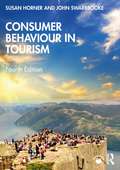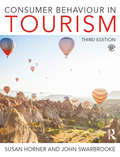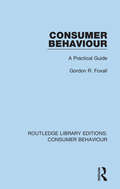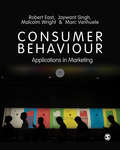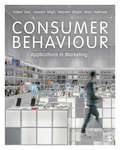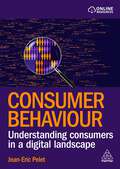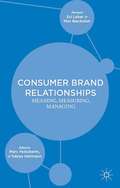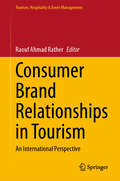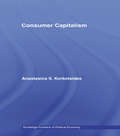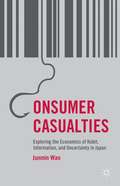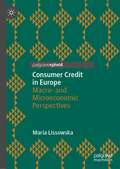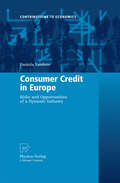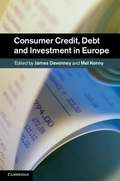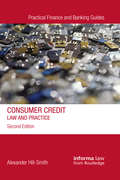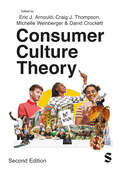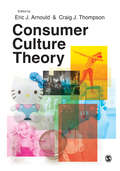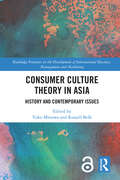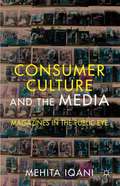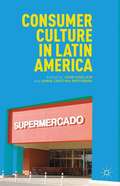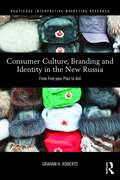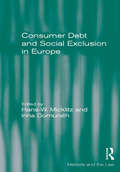- Table View
- List View
Consumer Behaviour in Tourism
by John Swarbrooke Susan HornerNow fully revised and updated, the fourth edition of this bestselling text provides students with a vital understanding of the nature of tourism and contemporary tourist behaviour. It also shows them how this knowledge can be used to manage and market tourism effectively in a variety of sectors of tourism including tour operations, hospitality, visitor attractions, transport, retail travel, cruising and airlines. This fourth edition has been updated to include: new material on the impact of Information Communication Technologies (ICT) developments in tourism including social media, AR and VR, the links between climate change, sustainability and tourist behaviour, and the impact of crises and natural disasters on tourism and the cruise industry thirty brand new international case studies about topical issues such as Airbnb, travel blogs, overtourism, Covid-19, the flight-shaming movement, wellness tourism, hunting and tourism, terrorism, dark tourism, the solo traveller, volunteer tourism, second home ownership, music festivals, pilgrimage tourism, film- and TV-induced tourism, and tourism in Antarctica new online resources including PowerPoint slides and a case archive. Each chapter features conclusions, discussion points, essay questions and exercises to help tutors direct student-centred learning and allow students to check their understanding of what they have read. This book is an invaluable resource for students studying tourism.
Consumer Behaviour in Tourism
by John Swarbrooke Susan HornerNow fully revised and updated, the third edition of this bestselling text provides students with a vital understanding of the nature of tourism and contemporary tourists behaviour in political, social and economic context and how this knowledge can be used to manage and market effectively in a variety of tourism sectors including: tourism operations, tourist destinations, hospitality, visitor attractions, retail travel and transport. This third edition has been updated to include: New material on the impacts of IT on research and marketing communications, the rise and influence of social media and virtual technology, the growth in the interest of sustainable tourism products including slow food, the experience economy and new consumer experiences including fulfilment. New international case studies throughout including growth regions such as the Middle East, Russia, Europe, China, India and Brazil. New companion website including Power point slides and a case archive. Each chapter features conclusions, discussion points and essay questions, and exercises, at the end, to help tutors direct student-centred learning and to allow the reader to check their understanding of what they have read. This book is an invaluable resource for students following tourism courses.
Consumer Behaviour: A Practical Guide (Routledge Library Editions: Consumer Behaviour)
by Gordon R. FoxallThis book is concerned with the application of the behavioural sciences, notably social psychology and sociology, to the study of consumer behaviour. The emphasis throughout is on making these sciences practical for the marketing manager by focusing on those aspects of consumer behaviour which prove useful for managerial decision-making. The introduction defines the scope of the book in these terms and outlines a model for the consumer buying process. The book conlcudes with detailed models of consumer choice.
Consumer Behaviour: Applications in Marketing
by Malcolm Wright Professor Marc Vanhuele Professor Robert East Dr Jaywant SinghExtending beyond a basic psychological approach to Consumer Behaviour, this text provides an empirical understanding of the subject and will be of particular appeal to those of the Ehrenberg-Bass tradition and those who view Marketing as a science. The third edition maintains a strong focus on the use of research, helping students to develop analytical and evidence-based thinking in marketing and take into consideration not just the individual but also the marketing environment. New examples and research findings have been included with special attention paid to the digital environment, including online consumer behaviour and research. Suitable for upper undergraduate and postgraduate students taking courses in consumer behaviour, as well as doctoral candidates with a focus on consumer behaviour.
Consumer Behaviour: Applications in Marketing
by Malcolm Wright Professor Marc Vanhuele Professor Robert East Dr Jaywant SinghExtending beyond a basic psychological approach to Consumer Behaviour, this text provides an empirical understanding of the subject and will be of particular appeal to those of the Ehrenberg-Bass tradition and those who view Marketing as a science. The third edition maintains a strong focus on the use of research, helping students to develop analytical and evidence-based thinking in marketing and to take into consideration not just the individual but also the marketing environment. New examples and research findings have been included with special attention paid to the digital environment, including online consumer behaviour and research. Suitable for upper undergraduate and postgraduate students taking courses in consumer behaviour, as well as doctoral candidates with a focus on consumer behaviour.
Consumer Behaviour: Applications in Marketing
by Robert East Malcolm Wright Marc Vanhuele Jaywant Singh‘A serious, thoughtful consumer behaviour text that focuses on substance rather than what′s fashionable in academic circles.’ Professor Byron Sharp, Ehrenberg-Bass Institute, University of South Australia ‘A thought-provoking text that challenges readers to consider consumer behaviour in new and refreshing ways and reflect on routine behaviours that occupy so much of daily life – buying brands, patronising stores, watching adverts, making recommendations.’ Professor Mark Uncles, Deputy Dean, Australian School of Business, University of New South Wales Written by respected marketing academics, this popular textbook extends beyond a basic psychological approach to Consumer Behaviour by providing a more empirical understanding of the subject, helping students grasp marketing applications at both individual and market levels. The fourth edition maintains a strong focus on research, particularly quantitative methods, helping higher-level students develop analytical and evidence-based thinking for success in scholarly and industry-based marketing research. The textbook contains new examples, exercises and research findings, along with recent advancements in the digital environment. Suitable for upper undergraduate and postgraduate students taking courses in consumer behaviour, as well as doctoral candidates with a focus on consumer behaviour. Robert East is Emeritus Professor at Kingston University London, UK. Jaywant Singh is Professor of Marketing at Southampton Business School, University of Southampton, UK. Malcolm Wright is Professor of Marketing at Massey University, New Zealand. Marc Vanhuele is Professor of Marketing at HEC Paris, France.
Consumer Behaviour: Applications in Marketing
by Robert East Malcolm Wright Marc Vanhuele Jaywant Singh‘A serious, thoughtful consumer behaviour text that focuses on substance rather than what′s fashionable in academic circles.’ Professor Byron Sharp, Ehrenberg-Bass Institute, University of South Australia ‘A thought-provoking text that challenges readers to consider consumer behaviour in new and refreshing ways and reflect on routine behaviours that occupy so much of daily life – buying brands, patronising stores, watching adverts, making recommendations.’ Professor Mark Uncles, Deputy Dean, Australian School of Business, University of New South Wales Written by respected marketing academics, this popular textbook extends beyond a basic psychological approach to Consumer Behaviour by providing a more empirical understanding of the subject, helping students grasp marketing applications at both individual and market levels. The fourth edition maintains a strong focus on research, particularly quantitative methods, helping higher-level students develop analytical and evidence-based thinking for success in scholarly and industry-based marketing research. The textbook contains new examples, exercises and research findings, along with recent advancements in the digital environment. Suitable for upper undergraduate and postgraduate students taking courses in consumer behaviour, as well as doctoral candidates with a focus on consumer behaviour. Robert East is Emeritus Professor at Kingston University London, UK. Jaywant Singh is Professor of Marketing at Southampton Business School, University of Southampton, UK. Malcolm Wright is Professor of Marketing at Massey University, New Zealand. Marc Vanhuele is Professor of Marketing at HEC Paris, France.
Consumer Behaviour: Understanding Consumers in a Digital Landscape
by Jean-Eric PeletWith this textbook, students will learn the concepts, theories and processes of consumer behaviour and how to apply them in a digitalized and competitive business landscape. Consumer Behaviour combines theoretical underpinnings with real-world practice to provide comprehensive, up-to-date coverage of the subject. It explores how consumer behaviour has evolved with the impact of technology, personalization and sustainability on perception and decision-making. This textbook is ideal for postgraduate students taking modules on Consumer Behaviour as part of their Marketing degrees. Features include:- Chapters on the psychological and social dynamics of consumer behaviour and the scientific foundations of learning and memory in brand engagement.- Examination of the role of AR/VR and the metaverse in retail experiences, live streaming and voice commerce as well as quantum computing and the importance of good UX design.- Ethical considerations of the digital consumer landscape, including privacy and data concerns. - Learning outcomes, key terms, a glossary and exercise questions international examples throughout, to help develop critical thinking.
Consumer Brand Relationships
by Marc Fetscherin Tobias HeilmannThe creation and management of customer relationships is fundamental to the practice of marketing. Marketers have long maintained a keen interest in relationships: what they are, why they are formed, what effects they have on consumers and the marketplace, how they can be measured and when and how they evolve and decline. While marketing research has a long tradition in the study of business relationships between manufacturers and suppliers and buyers and sellers, attention in the past decade has expanded to the relationships that form between consumers and their brands (such as products, stores, celebrities, companies or countries). The aim of this book is to advance knowledge about consumer-brand relationships by disseminating new research that pushes beyond theory, to applications and practical implications of brand relationships that businesses can apply to their own marketing strategies. With contributions from an impressive array of scholars from around the world, this volume will provide students and researchers with a useful launch pad for further research in this blossoming area.
Consumer Brand Relationships in Tourism: An International Perspective (Tourism, Hospitality & Event Management)
by Raouf Ahmad RatherThis book provides a comprehensive overview of consumer-brand relationships (CBR) in tourism and hospitality marketing management, including pre-, during- and post-COVID-19 pandemic. It critically investigates the current debates and questions within the field and includes both theory and practical cases from around the globe. It brings together leading specialists from various disciplinary backgrounds and geographical regions, to offer state-of-the-art theoretical reflections and empirical research on contemporary issues. This book is a reference point for scholars, researchers, academics and students in the field of CBR across disciplines including tourism marketing, hospitality, leisure, festivals, and events.
Consumer Capitalism (Routledge Frontiers of Political Economy)
by Anastasios KorkotsidesAn excellent addition to Routledge’s strong tradition of publishing exceptional books in heterodox economics, this innovative and groundbreaking volume draws on the work of Schumpeter, Marx and Sraffa, three of the most influential economists of all time. It bases value on a single, inwardly felt scarcity, the scarcity of life, which consumers scramble to experience more of through private possession of the product of socially contributed human time-space, in the form of knowledge embodied in commodities. This coercive urge, which appears outwardly as ‘commodity fetishism’, sets the context of ‘utility’ and self-interest, implicating consumers in the plunder of each other’s toil and of the earth, showing that capitalistic growth surveys existential distress rather than welfare. Existential motivational uniformity joins the seemingly disparate individualistic pursuits into a race for growth, while markets promote variety and innovation. Markets assist consumption innovations to blend with Schumpeterian production innovations as consumers try to foresee market conditions and structure their expenditures towards gaining positional advantage. These explain the structural dynamics of increased roundaboutness through adjustment of prices and demand to an evolving techno-structure. A valuable resource, this book unfolds a new vision of economic theorizing through the extreme basics of agent behaviour.
Consumer Casualties
by Junmin WanJunmin Wan takes a two prong approach to analysing this pressure in Japan in his new volume Consumer Casualties. He first clarifies the consumer preference for habit to identify useful approaches toward solving a number of economic issues, such as gambling and other addictive practices.
Consumer Credit in Europe: Macro- and Microeconomic Perspectives
by Maria LissowskaThis book provides a comprehensive outlook on the state and role of consumer credits in the European economy and households. It underlines the role of consumerism and digitalisation, in the framework of legislation. It covers two major turns in consumer credit evolution: the 2008 crisis and Covid pandemic. The first had socio-economic sources, the second one was an external event, but provoked important changes in consumer behaviour. Lockdowns deepened the preference for digital financial products. FinTech and BigData operators acquired broader opportunities with the development of distance services.These new financial services need adapted legislation. The recently published project of Consumer Credits Directive covers new means of communication, such as smartphones, and extends rules to new ways of crediting, like crowdfunding.Consumer credit availability changed the behaviour of households. The propensity of poorer households to save faded due to the ease of getting credit. However, financial insecurity during the Coronavirus pandemic made households limit credits and build precautionary savings.
Consumer Credit in Europe: Risks and Opportunities of a Dynamic Industry (Contributions to Economics)
by Daniela VandoneConsumer credit has become a topical issue for researchers, regulators and the banking industry in Europe as a result of increasing market integration, regulatory changes and a growing tendency of households to use debt to finance consumption. This study uses a cross-country approach to look at a broad range of issues related to consumer credit in Europe. Focusing on both the supply and demand sides, it takes into account the structure and performance of financial intermediaries, the socio-demographic and economic profile of households and their risk of over-indebtedness, as well as the regulatory framework, such as the new Consumer Credit Directive. In the light of this analysis, measures for the prevention and management of over-indebtedness are presented. This book is essential for postgraduate students and specialists in financial institutions, for regulators and policy-makers who are in charge of efficiency and stability of financial systems.
Consumer Credit, Debt and Investment in Europe
by Mel Kenny James DevenneyProduced under the auspices of an EU-funded Marie Curie research programme, this volume analyses vulnerability in European private law and scrutinises consumer protection in credit and investments in the context of the recent turmoil in financial markets and EU harmonisation initiatives in the area. It explores key issues such as responsible lending, the disclosure of information, consumer confidence, the regulation of consumer investment services and the protection of bank depositors. The chapters emanate from the 'Consumer Protection in Europe: Theory and Practice' duo colloquium which explored consumer protection in Europe in its theoretical and practical dimensions. These topics are even more relevant today given the passage of the Consumer Rights Directive, the appointment of an Expert Group on a common frame of reference, the Green Paper on European Contract Law and the ongoing deliberations surrounding the Common European Sales Law.
Consumer Credit: Law and Practice (Practical Finance and Banking Guides)
by Alexander Hill-SmithThe field of consumer credit law has undergone major and fundamental change in the recent past, due in part to the regulation since 1 April 2014 of consumer credit by the Financial Conduct Authority, and this book provides a clear and complete guide to this difficult area of law. Fully updated for the second edition, the author considers new developments including: the new authorisation process under the Financial Services and Markets Act 2000, including the interim permission regime, and its consequences; the new regime for financial promotions as applied to credit and hire advertising; the new rules controlling high cost short term lending and peer to peer lending; the new provisions of the recently released Consumer Credit Sourcebook (CONC); the new requirements governing mortgage lending as contained in MCOB; the requirements for distance selling and off-premises contracts as applied to consumer credit and consumer hire including the impact of the Consumer Contracts (Information, Cancellation and Additional Charges) Regulations 2013; the jurisdiction of the financial ombudsman service on consumer credit. Also considered is the recent case law on the powerful unfair relationships jurisdiction. This comprehensive and practical guide is essential reading for legal practitioners, finance houses, credit reference agencies and retail organisations.
Consumer Culture Theory
by David Crockett Michelle F. Weinberger Eric J. Arnould Craig J. Thompson*NOW FULLY UPDATED AND EXPANDED WITH SIX NEW CHAPTERS* Over the past forty years, Consumer Culture Theory (CCT) has emerged as a distinctive field of study that synthesizes diverse subjects such as anthropology, cultural studies, marketing, political theory and sociology to provide new insights into consumers’ relationships to the marketplace and the influence of commercial action on culture. This book, edited by leading scholars in CCT, contains contributions by many of its leading researchers, and distills this interdisciplinary field into a concise accessible overview for students and early career researchers. It describes the key themes, concepts and theoretical areas of CCT; explains why they are useful in understanding consumption and marketplace phenomena; and shows how they can be applied to a wide range of research contexts. Drawing on real-world scenarios, reflective tasks and international case studies to help aid theoretical understanding and critical thinking, the text is designed to support a course in CCT, supplement related study, and guide undergraduate and postgraduate students in writing a CCT-related dissertation/thesis. It is the go-to text for anyone who is curious about, new to CCT, or looking for an integrative compendium of CCT research and its implications. Eric J. Arnould is Emeritus Professor of Marketing at the Aalto University Business School, Finland. Craig J. Thompson is the Churchill-Bascom Professor of Marketing at the University of Wisconsin-Madison, USA. David Crockett is Professor of Marketing at the University of Illinois Chicago, USA. Michelle F. Weinberger is Associate Professor at the Medill School of Journalism, Media, Integrated Marketing Communications at Northwestern University, Illinois, USA.
Consumer Culture Theory
by David Crockett Michelle F. Weinberger Eric J. Arnould Craig J. Thompson*NOW FULLY UPDATED AND EXPANDED WITH SIX NEW CHAPTERS* Over the past forty years, Consumer Culture Theory (CCT) has emerged as a distinctive field of study that synthesizes diverse subjects such as anthropology, cultural studies, marketing, political theory and sociology to provide new insights into consumers’ relationships to the marketplace and the influence of commercial action on culture. This book, edited by leading scholars in CCT, contains contributions by many of its leading researchers, and distills this interdisciplinary field into a concise accessible overview for students and early career researchers. It describes the key themes, concepts and theoretical areas of CCT; explains why they are useful in understanding consumption and marketplace phenomena; and shows how they can be applied to a wide range of research contexts. Drawing on real-world scenarios, reflective tasks and international case studies to help aid theoretical understanding and critical thinking, the text is designed to support a course in CCT, supplement related study, and guide undergraduate and postgraduate students in writing a CCT-related dissertation/thesis. It is the go-to text for anyone who is curious about, new to CCT, or looking for an integrative compendium of CCT research and its implications. Eric J. Arnould is Emeritus Professor of Marketing at the Aalto University Business School, Finland. Craig J. Thompson is the Churchill-Bascom Professor of Marketing at the University of Wisconsin-Madison, USA. David Crockett is Professor of Marketing at the University of Illinois Chicago, USA. Michelle F. Weinberger is Associate Professor at the Medill School of Journalism, Media, Integrated Marketing Communications at Northwestern University, Illinois, USA.
Consumer Culture Theory
by Professor Eric J. Arnould Professor Craig J. ThompsonOutlining the key themes, concepts and theoretical areas in the field, this book draws on contributions from prominent researchers to unravel the complexities of consumer culture by looking at how it affects personal identity, social interactions and the consuming human being. A field which is characterised as being theoretically challenging is made accessible through learning features that include case study material, critical reflection, research directions, further reading and a broad mix of the types of consumers and consumption contexts including emerging markets and economies. The structure of the book is designed to help students map the field in the way it is interpreted by researchers and follows the conceptual mapping in the classic Arnould & Thompson 2005 journal article. The book is organised into three parts - the Consumption Identity, Marketplace Cultures and the Socio-Historic Patterning of Consumption. Insight is offered into both the historical roots of consumer culture and the everyday experiences of navigating the contemporary marketplace. The book is supported by a collection of international case studies and real world scenarios, including: How Fashion Bloggers Rule the Fashion World; the Kendal Jenner Pepsi Commercial; Professional Beer Pong, Military Recruiting Campaigns, The World Health Organisation and the Corporatization of Education. The go-to text for anyone new to CCT or postgraduate students writing a CCT-related thesis.
Consumer Culture Theory
by Professor Eric J. Arnould Professor Craig J. ThompsonOutlining the key themes, concepts and theoretical areas in the field, this book draws on contributions from prominent researchers to unravel the complexities of consumer culture by looking at how it affects personal identity, social interactions and the consuming human being. A field which is characterised as being theoretically challenging is made accessible through learning features that include case study material, critical reflection, research directions, further reading and a broad mix of the types of consumers and consumption contexts including emerging markets and economies. The structure of the book is designed to help students map the field in the way it is interpreted by researchers and follows the conceptual mapping in the classic Arnould & Thompson 2005 journal article. The book is organised into three parts - the Consumption Identity, Marketplace Cultures and the Socio-Historic Patterning of Consumption. Insight is offered into both the historical roots of consumer culture and the everyday experiences of navigating the contemporary marketplace. The book is supported by a collection of international case studies and real world scenarios, including: How Fashion Bloggers Rule the Fashion World; the Kendal Jenner Pepsi Commercial; Professional Beer Pong, Military Recruiting Campaigns, The World Health Organisation and the Corporatization of Education. The go-to text for anyone new to CCT or postgraduate students writing a CCT-related thesis.
Consumer Culture Theory in Asia: History and Contemporary Issues (Routledge Frontiers in the Development of International Business, Management and Marketing)
by Yuko Minowa Russell BelkWe live in times of increasing world uncertainty. Consumer culture in Asia has embodied such precariousness, with their unprecedented states of both prosperity and vulnerability. Works in this volume examine the consumer cultures that exist in today’s precarious Asia. They do this through culturally oriented, critical consumer research. How deeply has the consumer precariousness in Asia been intertwined with the sociohistorical patterning of consumption including class, gender, and other social categories? How do these problematics affect consumers’ identity projects, consumer rituals, and marketplace cultures? How is consumer precariousness aggravated by the governmentality of the superpower? How does the changing landscape of inter-Asian and global popular culture impact consumer culture in these nations? Together, the authors in this volume attempt to answer these questions through consumer research within the paradigm known as consumer culture theory (CCT). Since most CCT inquiry has been in Western contexts, this volume augments the existing knowledge. It presents the most current, critical, historical, and material consumer studies focused on Asia. This volume will be of interest to seasoned CCT researchers and academics, for anyone new to CCT, and for postgraduate students interested in CCT or writing a consumer culture-related thesis.
Consumer Culture and the Media
by Mehita IqaniHow did consumer culture become synonymous with westernised societies? Iqani argues that it is the way it is promoted by media texts. She provides a detailed analysis of publicly displayed consumer magazine covers and engages with big questions about the public, power and identity in mediated consumer culture.
Consumer Culture in Latin America
by John Sinclair Anna Cristina PertierraHow can we understand consumption in a region known for its cultural richness and vast inequalities? What do Latin Americans consume, and why? Examining topics from tango and samba to sex workers in Costa Rica, from eating tamales to selling ice in the Andes, and from building and moving houses to buying cell phones, this collection brings together original research on some of the many forms of consumption and consumers that contribute to Latin American cultures and histories. Contributors include sociologists, anthropologists, media and cultural studies scholars, geographers and historians, showcasing diverse approaches to understanding Latin American consumption practices and consumer culture.
Consumer Culture, Branding and Identity in the New Russia: From Five-year Plan to 4x4 (Routledge Interpretive Marketing Research)
by Graham H.J. RobertsAs shopping has been transformed from a chore into a major source of hedonistic pleasure, a specifically Russian consumer culture has begun to emerge that is unlike any other. This book examines the many different facets of consumption in today’s Russia, including retailing, advertising and social networking. Throughout, emphasis is placed on the inherently visual - not to say spectacular - nature both of consumption generally, and of Russian consumer culture in particular. Particular attention is paid to the ways in which brands, both Russian and foreign, construct categories of identity in order to claim legitimacy for themselves. What emerges is a fascinating picture of how consumer culture is being reinvented in Russia today, in a society which has one, nostalgic eye turned towards the past, and the other, utopian eye, set firmly on the future. Borrowing concepts from both marketing and cultural studies, the approach throughout is interdisciplinary, and will be of considerable interest, to researchers, students and practitioners wishing to gain invaluable insights into one of the most lucrative, and exciting, of today’s emerging markets.
Consumer Debt and Social Exclusion in Europe (Markets and the Law)
by Hans-W. Micklitz Irina DomurathThis book analyses the dichotomy between the goal of social inclusion and the effect of social exclusion through over-indebtedness since 2008 in Europe. Filling a vital gap in the current literature on the effects of the financial and economic crisis, this volume puts into context academic discussion with the real-life dimension of over-indebtedness. Reports from six European countries provide socio-economic and legal information on over-indebtedness as well as the regulatory and judicial responses to the problems entailed by over-indebtedness. They form the empirical background for five analyses of different aspects of the inclusion-exclusion dichotomy. It becomes clear that in the context of credit expansion, individual over-indebtedness has turned into a social issue, which the current design of the consumer credit and mortgage system in Europe has helped to produce while disregarding the consequential danger of social exclusion.
